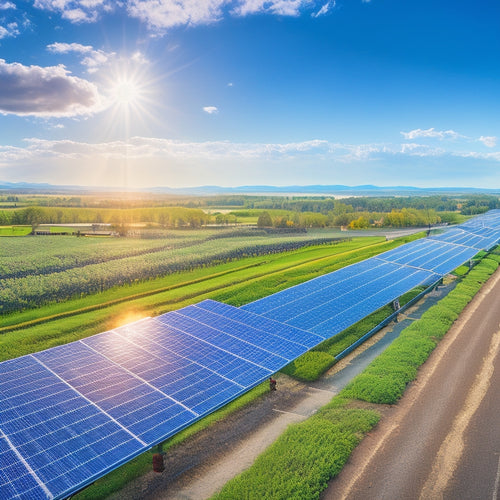
House Solar Panels
Share
When you install house solar panels, you'll greatly reduce your energy bills by generating clean energy on-site, potentially eliminating energy costs entirely. You'll also increase your property value by up to $15,000, making your home more attractive to environmentally conscious buyers. Additionally, you'll contribute to a cleaner environment and enjoy financial independence from utility companies. By understanding how solar panels work, including energy conversion rates and ideal panel orientation, you can maximize your investment returns. Now, take the next step and investigate how to tailor a solar panel system to your unique home and energy needs.
The Essentials
- House solar panels significantly reduce energy bills by generating clean energy on-site, potentially eliminating energy costs entirely.
- Solar installations can increase home value by up to $15,000, providing a competitive advantage in the real estate market.
- Proper solar panel placement and orientation on rooftops maximizes energy output, with south-facing roofs providing optimal sunlight exposure.
- Advanced solar technologies and monitoring systems help track energy production, leading to greater energy independence through optimized systems.
- Regular cleaning of panels prevents dust and debris buildup, ensuring optimal energy capture and return on investment.
Zero Energy Bills
You can save money now by installing house solar panels, which will considerably reduce your energy bills.
By generating your own clean energy, you'll eliminate a substantial portion of your energy costs, leading to substantial savings over time.
With a well-designed solar panel system, you can even eliminate your energy bills entirely, enjoying the financial benefits of zero energy bills.
Save Money Now
Their energy independence begins with a significant reduction in their utility bills, as homeowners with house solar panels start generating their own clean energy.
You'll be amazed at how quickly you can save money now. With solar panels, you'll produce electricity on-site, reducing your reliance on the grid and slashing your energy bills.
By switching to solar power, you'll not only reduce your energy expenses but also contribute to a clean and renewable source of energy that produces no emissions or pollution, helping to mitigate climate change and protect the environment for future generations.
Additionally, solar financing options are available to help you spread the cost over time, making it more affordable to switch to clean energy.
You'll also benefit from government incentives, such as the Solar Investment Tax Credit (ITC), which can cover up to 26% of your solar panel system's cost.
By investing in house solar panels, you'll not only reduce your energy expenses but also increase your property value.
You'll be free from the volatility of energy prices and enjoy a sense of independence, knowing you're generating your own clean energy.
With solar power, you'll save money now and enjoy long-term financial benefits.
Eliminate Energy Costs
One of the most noteworthy benefits of house solar panels is the potential to eliminate energy costs altogether, resulting in zero energy bills.
You'll no longer be tied to your utility company, and you'll have the freedom to use as much energy as you need without worrying about the cost. With solar panels, you're generating your own clean energy, which means you won't be paying for electricity from the grid.
This can be especially beneficial for homeowners who live in areas with high energy rates or those who use a lot of energy to power their homes. By investing in solar power and battery storage solutions, homeowners can't only reduce their energy costs but also embrace a cleaner, more sustainable future and reduce their carbon footprint.
To achieve zero energy bills, you'll need to verify your solar panel system is sized correctly to meet your energy needs. This may require a larger system, which can increase installation costs.
However, with federal and state solar incentives, the cost of going solar is more affordable than ever. In fact, you can claim a tax credit of up to 26% of the total installation cost, considerably reducing the upfront expense.
Increased Property Value
You'll see a significant increase in your home's selling price when you install solar panels, as they're a highly sought-after feature among environmentally conscious buyers.
By switching to a home solar system, you can also save thousands on your electricity bill, which is a major selling point for potential buyers renewable energy credits.
In fact, studies have shown that solar panels can increase your property value by up to 17%.
This added value is a long-term benefit, as it remains with the property even after you've recovered your initial investment.
Boosts Selling Price
Since installing solar panels can greatly reduce energy costs, it's no surprise that they also enhance a property's selling price.
You'll reap the benefits of increased property value when you decide to sell your home. According to solar market trends, homes with solar panels sell for up to 17% more than similar homes without them. This increased value is reflected in property appraisals, which take into account the energy-saving features of your home.
As a homeowner, you'll enjoy the freedom to sell your property at a higher price, thanks to the investment you made in solar panels. This is especially important in today's competitive real estate market, where every advantage counts.
By installing solar panels, you're not only reducing your energy bills but also elevating your property's resale value. This increased selling price can be a major selling point for potential buyers, setting your home apart from others in the neighborhood.
With solar panels, you're not only saving money on energy costs but also making a smart investment in your property's future.
Adds Long-Term Value
By incorporating solar panels into your home, you're making a long-term investment that pays off in multiple ways. One of the most significant advantages is the increased property value it brings. According to a study by the National Renewable Energy Laboratory, solar installations can increase your home's value by up to $15,000. This is because solar panels are viewed as a desirable feature by potential buyers, making your property more attractive and competitive in the market.
As a homeowner, you'll reap the benefits of increased property value through higher selling prices or refinancing opportunities.
Additionally, solar investments provide long-term residential benefits, such as reduced energy bills and a smaller carbon footprint. With solar panels, you'll enjoy a sense of freedom from rising energy costs and contribute to a cleaner environment.
Efficient Energy Harvesting System
You'll want to optimize your house solar panels' energy conversion rates, as they directly impact the amount of electricity you generate.
Monocrystalline solar panels, known for their high solar panel efficiency, can greatly improve your energy output.
Proper panel orientation matters, too, as it can greatly affect energy output - even a slight deviation from the ideal angle can result in reduced performance.
Energy Conversion Rates
Most residential solar panels boast an impressive energy conversion rate of around 15% to 20%, which means they can capture a significant amount of energy from the sun. This rate measures the panel's ability to convert sunlight into usable electricity. You want a high energy conversion rate to maximize your energy output and reduce your reliance on the grid.
| Panel Technology | Solar Efficiency |
|---|---|
| Monocrystalline Silicon | 15% - 20% |
| Polycrystalline Silicon | 12% - 15% |
| Thin-Film | 7% - 14% |
As you can see, different panel technologies have varying energy conversion rates. Monocrystalline silicon panels are the most efficient, while thin-film panels are the least efficient. When choosing a solar panel, you should consider the energy conversion rate to guarantee you're getting the most out of your investment. Higher efficiency panels may cost more, but they'll provide more energy per hour of sunlight. By understanding energy conversion rates, you can make an informed decision and achieve your goal of energy independence.
Panel Orientation Matters
The position of your solar panels on your roof plays an important role in maximizing energy output. Proper panel placement and orientation can greatly impact the amount of sunlight exposure your panels receive, ultimately affecting the efficiency of your energy harvesting system.
When it comes to panel orientation, you'll want to evaluate the direction your roof faces and the angle at which the panels will be installed. Ideally, your panels should face directly at the sun, which means a south-facing roof is best. However, if your roof faces east or west, you can still achieve decent energy output.
The angle of installation is also vital, as it affects the amount of sunlight that hits the panels. A general rule of thumb is to install panels at an angle equal to your latitude to maximize energy production.
Check Your Roof Size
You'll need to assess your roof's space availability to determine how many solar panels can fit.
Considering factors like photovoltaic cells and the energy requirements from your previous electricity bills can help you determine the ideal number of panels.
The shape of your roof also plays a vital role, as irregularly shaped roofs or those with multiple skylights may require specialized installation or additional hardware.
Roof Space Availability
With your house selected, proceed to evaluate its roof size to determine the available space for solar panels. Measure the length and width of your roof to calculate its total square footage. This will give you an idea of how many solar panels you can fit.
Consider the size and shape of the panels you're interested in, as well as the space required between them for proper airflow and maintenance access.
Next, identify any shading issues that may impact the performance of your solar panels. Look for obstructions such as trees, chimneys, vents, or skylights that may cast shadows on your roof.
Shading can greatly reduce the energy output of your solar panels, so it's crucial to account for these obstructions when determining the available roof space.
Roof Shape Considerations
Measuring your roof's size is only half the battle; its shape also plays a significant role in determining the ideal solar panel placement.
You'll need to take into account your roof's angle, as a steeply pitched roof might require specialized mounting systems. Shading issues can also arise from surrounding trees, buildings, or design features like skylights or vents.
Verify the solar panels are compatible with your roof's material, whether it's asphalt shingles, metal, or clay tiles. Certain roof shapes or styles, like those with multiple gables or curved lines, may present installation challenges.
Aesthetic concerns, such as maintaining your home's original look, should also be taken into account. Don't forget to check local regulations regarding solar panel installations on your type of roof.
You'll need to confirm easy maintenance access and take into account wind resistance and snow load when choosing the right solar panels for your roof.
Higher Energy Conversion Rate
You're likely looking for solar panels that can efficiently harvest energy from the sun.
A higher energy conversion rate is essential, as it directly impacts the amount of electricity your system produces.
With a more efficient energy conversion rate, you'll be able to generate more power from your roof's available space.
Efficient Energy Harvesting
Your solar panel system's energy conversion rate hinges on efficient energy gathering, which is critical for maximizing your return on investment. This is where advanced solar panel technologies come into play, enabling you to utilize renewable energy sources more effectively.
To achieve efficient energy gathering, you need to verify your solar panels are installed at the ideal angle and direction to capture maximum sunlight. Additionally, cleaning your solar panels regularly is essential to prevent dust and debris from reducing their energy output.
Efficient energy gathering also involves selecting high-quality solar panels with high conversion efficiency rates. Look for solar panels with a high fill factor, open-circuit voltage, and short-circuit current to maximize your energy output.
Moreover, consider investing in a monitoring system to track your energy production and identify areas for improvement. By optimizing your solar panel system's energy gathering capabilities, you'll be able to generate more electricity and reduce your reliance on the grid, ultimately achieving greater energy independence.
Frequently Asked Questions
How Long Does It Take to Install Solar Panels on a House?
You'll typically spend 1-3 days overseeing the installation process, but the entire installation timeline can take 2-6 months, depending on permits, inspections, and utility approvals, before you're utilizing free energy and breaking free from grid dependence.
Can I Install Solar Panels on My Own Without a Professional?
Take the bull by the horns and consider DIY installation, but be aware that it's not a walk in the park. You'll need to purchase solar panel kits and tackle complex electrical work, so it's essential you're comfortable with the technical aspects.
How Often Should I Clean My Solar Panels for Optimal Performance?
You should prioritize solar panel maintenance by cleaning them every 6-12 months, depending on your location's climate and pollution levels, to guarantee peak energy output and prevent performance degradation.
Are Solar Panels Resistant to Extreme Weather Conditions?
You think Mother Nature's fury can take down your eco-friendly dreams? Think again! Solar panels are built to withstand extreme weather conditions, boasting impressive weather durability and storm resilience - so go ahead, utilize that renewable energy with confidence!
Can I Use Solar Panels to Charge My Electric Vehicle?
You can charge your electric vehicle with solar power, thanks to solar charging systems designed for EV compatibility, allowing you to fuel your freedom on the go, independent of the grid, with a clean and renewable energy source.
Final Thoughts
You'll be skipping those pesky energy bills like they're going out of style! With house solar panels, you'll be generating so much free energy, you'll be wondering how you ever lived without them. Your property value will skyrocket, and your efficient energy harvesting system will be the envy of the neighborhood. Just make sure your roof is big enough to handle the awesomeness. And with a higher energy conversion rate, you'll be laughing all the way to the bank!
Related Posts
-

Top Portable Refrigerators for Camping Adventures
When you're camping, having a reliable portable refrigerator can make all the difference for keeping your food fresh ...
-

Applications of Photovoltaic Systems
Photovoltaic systems are versatile, converting sunlight into electricity for various applications. You can use them i...
-

Replacing Old Appliances With Sustainable Alternatives
Replacing old appliances with sustainable alternatives can change your home into an energy-efficient space. Not only ...


